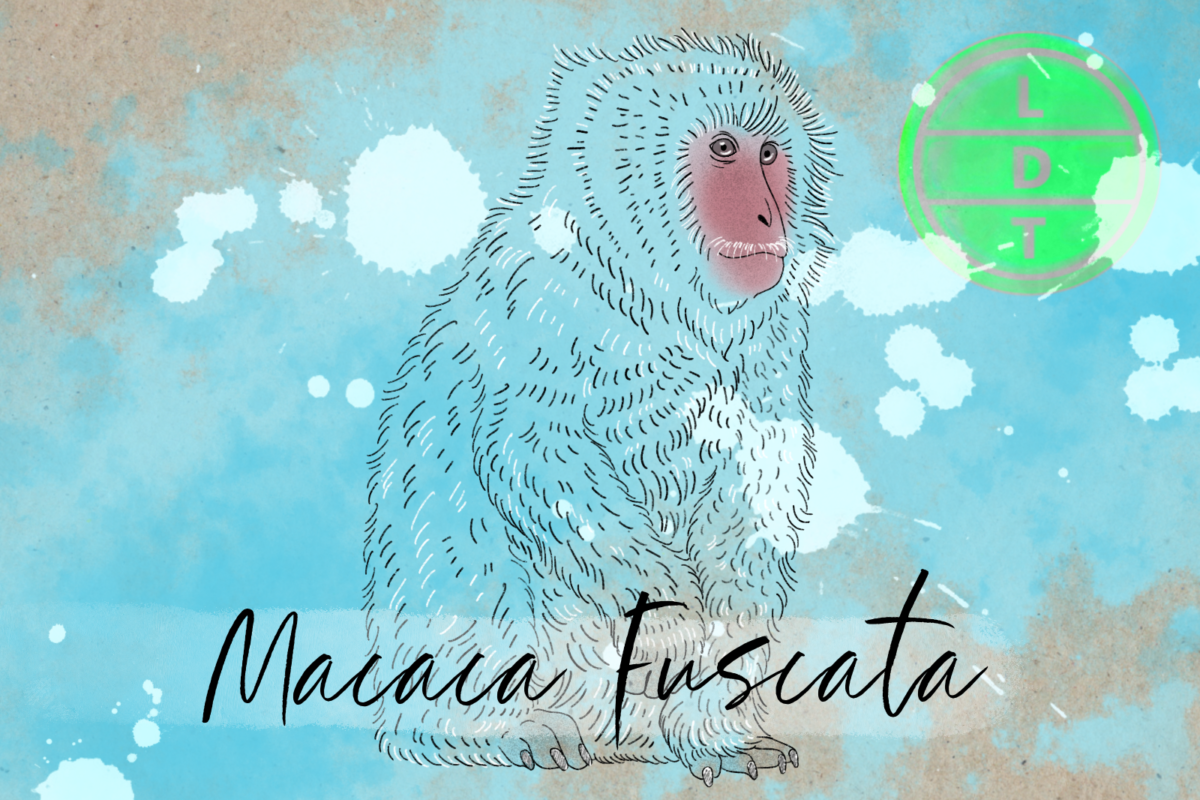“…and today we’re talking about petite pink primates in plush parkas. But more on that later.”
In the highlands of Japan, one tufty monkey likes to season its food, play in the snow, and waylay unsuspecting people in its free time. It uses all of its simian smarts to quickly learn new behaviors and then use them against their human interlopers. But being a pink-faced eskimo in a cold climate means you need to use every means at your disposal to survive here in Life, Death, and Taxonomy.
Description
- Japanese macaques are monkeys that are covered in thick tan to gray fur.
- They are pink of face.
- They look like petite pink people in plush parkas.
- Unlike many monkeys, they have very short and stubby tails.
Measure Up
Height
- 57.0 cm (22.4 in)
- How many Japanese macaques go into the height of the tallest mountain in Japan?
- Hint: Mount Fuji is on the island of Honshu. It’s actually a dormant volcano that last erupted in 1707. The surrounding forest is said to be haunted by spirits and Yokai.
- 6,637 macaques. Mount Fuji is 3,776.24 m (12,389.2 ft) tall.
Weight
- 11.3 kg (25 lb)
- How many Japanese macaques go into the weight of wasabi produced in Japan each year?
- Hint: Wasabi is actually notoriously difficult to produce. It requires moist soil, shade, and between 40 to 68 degrees fahrenheit.
- 80,000 macaques. Japan produces around 1,000 tons of wasabi each year.
Fast Facts
Macaques are semi terrestrial and will spend time in trees and on the ground.
They’re thick coats allow them to be the northernmost monkey.
Japanese macaque society is matrilineal. Females will stick with their mother’s social group all their lives, while males will move out before they reach sexual maturity. Troops will contain several family groups.
Macaques will communicate through vocalizations including coos, alarm calls, and something called “girneys,” which are soft vocalizations.
Japanese macaques are intelligent and they have been seen flavoring their food. Sweet potatoes left for them on the beach were cleaned with river water and dipped in salty sea water for flavor.
The Japanese macaque population is growing to the point that they are clashing with humans. After World War 2, conservation efforts were extremely successful. But the monkeys can cause significant damage to property, steal food, and they have even attacked children.
This month, a monkey was killed after a string of marauding monkey attacks on humans, injuring 50 people.
Major Fact: One Smart Potato
These monkeys are particularly smart. They’ve been shown to quickly pick up learned behaviors
One study involved having researchers leave sweet potatoes out on the sand near the ocean.
Most of the monkeys brushed off the sand before eating it, which isn’t that effective if you’ve ever tried to eat something that’s fallen in the sand.
However, one monkey named Imo dunked her potatoes in the river to get the sand off. Soon, other monkeys in her barrel started doing the same, and Imo even went a step further and taught the other monkeys to dunk their potatoes in the ocean for a little salt seasoning.
They would even do it after every bite to season the whole meal.
Researchers have also observed that same trailblazing monkey, Imo, chucking wheat mixed with dirt or sand into the water since wheat floats and dirt and sand sink.
They also picked up bathing in hot springs after a female named Mukubili wandered into one while trying to get at some soybeans that fell in. They can also roll snowballs to play with, which is certifiably adorable.
What isn’t so adorable is the completely unexpected topical nature of this episode. The destruction of their mountain forest habitat has driven them into the nearby villages and cities.
One such city is Yamaguchi – no not the tiny neopoets everyone had on their backpacks in the early ‘aughts – the Japanese city that’s currently experiencing the wrath of nature.
In true Princess Mononoke-esque fashion, the macaques have spent the last month or so attacking residents of this mountain – probably at the bidding of an immortal forest deity but researchers aren’t 100% sure.
More than 50 Yamaguchians have been attacked. They’ll mostly sneak up and grab the legs of women and children. One elderly man was attacked in his sleep.
Fortunately, no one has been seriously injured but people have started carrying umbrellas and tree trimmers to defend themselves because the forecast always calls for monkeys.
The city officials have told people to lock their doors and windows and have even hired a team of hunters to catch the terrorist troop, the belligerent barrel of monkeys. But the monkeys are hard to trap since they’re not in it for food. Like the joker, they’re simply agents of chaos.
Ending: So take a bath in the hot springs, roll up a snowball, and execute nature’s fury like the ecoterrorist macaques here in LDT.

